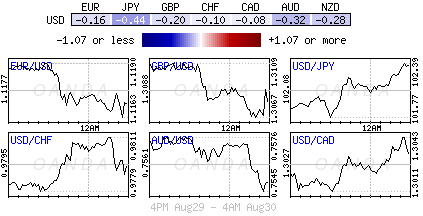Tuesday August 30: Five things the markets are talking about
Two days after a ‘hawkish’ Fed in Jackson Hole, the U.S yield curve continues to flatten as the Feds favourite inflation measure stays below U.S policy makers +2% inflation target.
Data Monday showed that July’s personal consumption expenditures (PCE) showed no growth in annualized inflation. The core-rate remains at +1.6%, the same as March through June. Despite the consumer sector stateside continuing to advance, growth towards +2% inflation has stalled. The data strengthens the case for an increase in the fed funds rate; however, it does not suggest a state of urgency.
The focus now turns to this Friday’s U.S non-farm payroll (NFP) and its implications for near term policy. Early consensus suggests that a payroll headline print above +150k will make September Fed decision a very close call and generally give the green light for a rate hike later this year. However, expect those odds to change by the end of the week.
Despite the importance of this Friday’s employment number, market volatility remains compressed in an otherwise typically thin pre U.S/Canada holiday week (September 5).
1. Global stocks mixed results
Asia’s stock indices were broadly higher overnight, lifted by rising commodities prices, however volatility in the yen managed to cap the Nikkei’s gains.
With doubts surrounding Fed rate hikes and limiting the ‘big’ dollars advance, investors are willing to count on more policy stimulus elsewhere in the world to justifying owing equities.
Australia’s S&P/ASX 200 closed up +0.2%, while Hong Kong’s Hang Seng Index rose +1%, the Shanghai Composite Index was up +0.2 and Korea’s KOSPI closed 0.4% higher. The Nikkei remains a currency story, closed down -0.07%.
In European, equities are extending their monthly advance, as a weaker EUR boosted exporters. The Stoxx Europe 600 Index is up +0.3% in early trade, while the FTSE 100 is little changed as U.K. markets reopen.
Indices: Stoxx50 1.0% at 3029, FTSE little changed at 6,836, DAX +1.0% at 10,649, CAC 40 +1.03% at 4,469, IBEX 35 +0.8% at 8,684, FTSE MIB +1.47% at 16,900, SMI +0.4% at 8,217, S&P 500 Futures -0.01%
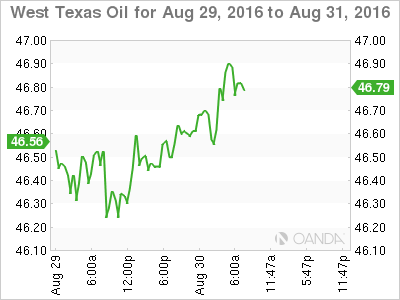
2. Crude rallies as dollar backs off
Crude Oil prices are edging higher ahead of the U.S open as the dollar backs off from its two-week high against a plethora of major currencies.
Expect the gains to remain capped on doubts that global crude producers will come to an agreement next month to an output freeze. Pressure will also come from increased daily production levels in Nigeria – militant groups have ended attacks on the oil and gas industry that had reduced output by -700k barrels a day.
Brent crude futures (Oct) are trading at +$49.28 per barrel, up +2c, while West Texas Intermediate (WTI) crude is up +9c at $47.07 a barrel.
Gold prices remain confined to a tight trading range (-0.2% to $1,320.50) as investors wait for cues on the timing of U.S. interest rate hike from non-farm payroll (NFP) later this week.
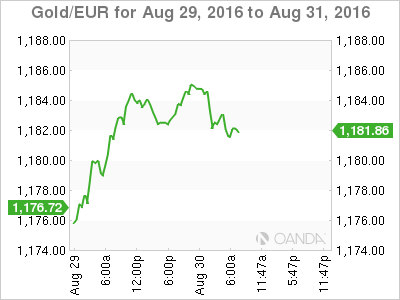
3. Sovereign yields contained
The yield on U.S 10's is little changed (+1.589%) in overnight trading.
With Fed officials stressing they will carefully consider economic data before arriving at any policy conclusions, investors require fundamental proof for undertaking yields next directional move and Friday’s NFP will go along way in justifying that.
Dealers have pared back some of their September Fed hike exuberance. Currently, futures prices indicate that there is a +22% possibility that U.S policy makers will tighten at the September 20-21st meeting (down from +33% last Friday). The chance that U.S. policy makers will raise rates by year-end remains at +57%.
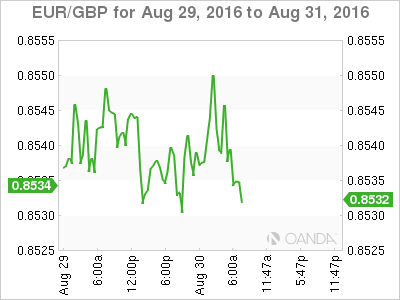
4. Dollar firm, but confined
The ‘might’ buck continues to find pockets of strength across the board as investors digest last week’s ‘hawkish’ Fed comments that the “case for a near-term increase in interest rates was strengthening.”
Capital markets now switches its focus to Friday’s U.S payroll data for clues of how likely a September rate rise is. Aside from yen (see below), the major pairs lack the momentum to move any lower outright.
All eyes will remain on Fed communication and whether Fed Vice-Chair Fischer could correct his “hawkish” stance.
EUR/USD is down -0.2% at €1.1172, USD/JPY is up +0.3% at ¥102.25 and GBP/USD is down -0.2% at £1.3082.
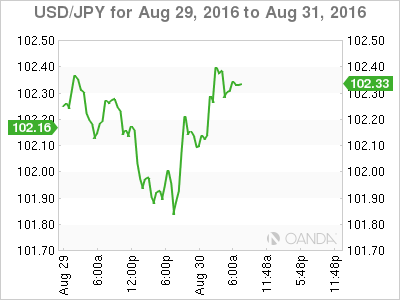
5. Long Yen trades a problem
For sometime the FX market has been overly long yen positions for a number of reasons, source of funding for carry trades and for risk aversion purposes. With the BoJ’s back against the wall, the long yen trade looked appealing.
A ‘hawkish’ Fed and a ‘dovish’ Kuroda at last weekend’s Jackson Hole has been pressurizing these ‘weaker’ longs (¥102.33). Overnight, the yen ‘bear’ got further support from PM Abe’s advisor Hamada – he called on the Finance Ministry to “courageously” intervene in FX markets to stem the yen’s appreciation, accusing the MOF of lost credibility on exchange rate. The response is that cabinet is closely watching FX markets and prepared to respond appropriately.
Currently, the market consensus is leaning towards the Bank of Japan (BoJ) favoring deeper negative interest rates at next months monetary policy meeting (September 20).
